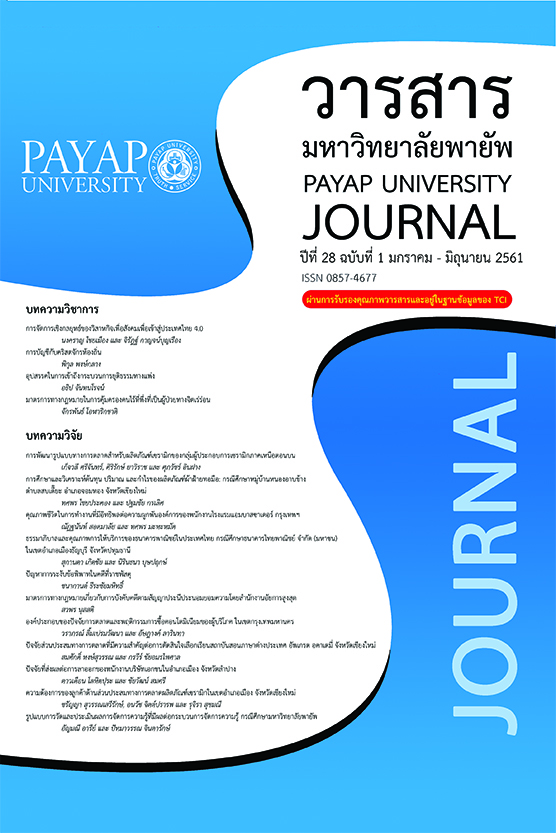รูปแบบการวัดและประเมินผลการจัดการความรู้ที่มีผลต่อกระบวนการจัดการความรู้ กรณีศึกษามหาวิทยาลัยพายัพ
Main Article Content
บทคัดย่อ
การวิจัยครั้งนี้มีจุดประสงค์เพื่อ (1) ศึกษารูปแบบการวัดและประเมินผลการจัดการความรู้ และกระบวนการจัดการความรู้ (2) การวัดและประเมินผลการจัดการความรู้ที่มีผลต่อกระบวนการจัดการความรู้ และ (3) ศึกษาเปรียบเทียบการประเมินผลการจัดการความรู้และกระบวนการจัดการความรู้ของหน่วยงานสายวิชาการและหน่วยงานสายสนับสนุน โดยศึกษาจากบุคลากรมหาวิทยาลัยพายัพ จำนวน 258 คน การวิเคราะห์ข้อมูล ใช้แบบสอบถามเป็นเครื่องมือในการวิจัย สถิติที่ใช้ในการวิเคราะห์ได้แก่ ค่าเฉลี่ย ค่าส่วนเบี่ยงเบนมาตรฐาน การวิเคราะห์องค์ประกอบ การวิเคราะห์สัมประสิทธิ์สหสัมพันธ์ การวิเคราะห์ถดถอยพหุคูณ การวิเคราะห์ถดถอยอย่างง่าย และการวิเคราะห์ความแตกต่าง
ผลการวิจัยพบว่า (1) รูปแบบการวัดและประเมินผลการจัดการความรู้ประกอบด้วย การนำองค์การ การวางแผนกลยุทธ์ การมุ่งเน้นลูกค้า การวัด วิเคราะห์ และการจัดการความรู้ การมุ่งเน้นบุคลากร และการจัดการกระบวนการ โดยมีค่าน้ำหนักองค์ประกอบเท่ากับ 0.897, 0.897, 0.878, 0.946, 0.964 และ 0.953 ตามลำดับ มีค่าไคสแควร์ () = 7.927 ที่ค่าองศาอิสระ (df) = 6 ค่าความน่าจะเป็น (p) = 0.243 ค่าดัชนี GFI=0.990, AGFI =0.966, RMSEA=0.035, RMR=0.003 และรูปแบบกระบวนการจัดการความรู้ ประกอบด้วย การบ่งชี้ความรู้ การสร้างและแสวงหาความรู้ การจัดการความรู้ให้เป็นระบบ การประมวลและกลั่นกรองความรู้ การเข้าถึงความรู้ การแบ่งปันแลกเปลี่ยนความรู้ และการเรียนรู้ โดยมีค่าน้ำหนักองค์ประกอบเท่ากับ 0.767, 0.887, 0.935, 0.888, 0.951, 0.888 และ 0.944 ตามลำดับ มีค่าไคสแควร์ (
) = 12.517 ที่ค่าองศาอิสระ (df) = 8 ค่าความน่าจะเป็น (p) = 0.130 ค่าดัชนี GFI=0.986, AGFI =0.952 , RMSEA=0.047, RMR=0.0096 (2) ผลการวิเคราะห์การวัดและประเมินผลการจัดการความรู้ที่มีผลต่อกระบวนการจัดการความรู้พบว่า การวัดและประเมินผลมีความสัมพันธ์กับกระบวนการจัดการความความรู้ในระดับที่สูงมาก ภาพรวมเท่ากับ 0.892 เมื่อพิจารณารายด้านได้แก่ การนำองค์การ การวางแผนกลยุทธ์ การมุ่งเน้นลูกค้า การวัด วิเคราะห์ และการจัดการความรู้ การมุ่งเน้นบุคลากร และการจัดการกระบวนการ พบว่ามีความสัมพันธ์เท่ากับ 0.853, 0.856, 0.785, 0.856, 0.851 และ 0.827 ซึ่งอยู่ในระดับที่สูงมากเช่นเดียวกัน จึงทำให้เกิดปัญหาภาวะร่วมเส้นตรงพหุ (Multiple Regression) จึงทำการวิเคราะห์การถดถอยอย่างง่าย พบว่าการวัดและประเมินผลการจัดการความรู้ทุกด้านมีผลต่อกระบวนการจัดการความรู้ (3) ศึกษาเปรียบเทียบการประเมินผลการจัดการความรู้และกระบวนการจัดการความรู้ของหน่วยงานสายวิชาการและหน่วยงานสายสนับสนุน พบว่าไม่มีความแตกต่างกันที่ระดับนัยสำคัญทางสถิติ 0.05
Article Details
References
น้ำทิพย์ เสมอเชื้อ. (2552). การเปรียบเทียบผลการดำเนินการจัดการความรู้ระหว่างมหาวิทยาลัยราชภัฏเชียงใหม่และมหาวิทยาลัยพายัพ. รัฐประศาสนศาสตร์มหาบัณฑิต, มหาวิทยาลัยเชียงใหม่.
บุญดี บุญญากิจ และนภัสวรรณ ไทยานันท์. (2555). ตรวจสุขภาพองค์กรด้วย KM Assessment (KMA). กรุงเทพฯ : แผนกประมวลความรู้ ฝ่ายส่งเสริมการเพิ่มผลผลิต สถาบันเพิ่มผลผลิตแห่งชาติ.
บุษบา อารีย์. (2546). ศึกษาความรู้เกี่ยวกับมาตรฐานการบัญชีของผู้ประกอบการวิสาหกิจขนาดกลางและขนาดย่อมในเขตภาคเหนือตอนบน. วารสารมหาวิทยาลัยพายัพ จังหวัดเชียงใหม่, เดือนมกราคม 1, 2546, 6-14.
ปณิตตรา นราภิรมย์ขวัญ และศิวะนันท์ ศิวพิทักษ์. (2559). การจัดการความรู้ของมหาวิทยาลัยในกำกับรัฐและมหาวิทยาลัยเอกชน. SUTHIPARITHAT, 30(95), 186-200.
มนต์ชัย พงษ์นุ่มกุล. (2555). การศึกษาแนวทางการประเมินผลการจัดการความรู้สำหรับโรงเรียนแพทย์ในประเทศไทย. สารนิพนธ์ปริญญาวิทยาศาสตร์บัณฑิต, มหาวิทยาลัยธุรกิจบัณฑิตย์.
ศิริพงษ์ เศาภายน. (2551). ทุนมนุษย์และบทบาทในการพัฒนาองค์กร. วารสารรามคำแหง, 25(4), 200-210.
สำนักงานคณะกรรมการการอุดมศึกษา. (2557). คู่มือประกันคุณภาพการศึกษา. นนทบุรี: ภาพพิมพ์.

